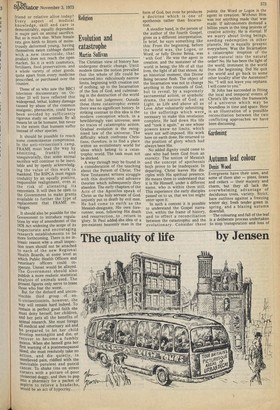Religion
Evolution and catastrophe
Martin Sullivan
The Christian view of history has undergone drastic change. Until modern times the notion prevailed that the whole of life could be crammed into ridiculously narrow limits, beginning with creation out of nothing, up to the Incarnation of the Son of God, and culminating in the destruction of the world and the last judgement. Outside these three catastrophic events there was no significant history. In striking contrast to this idea is the modern conception which, in a bewilderingly vast universe, sees no traces of catastrophic action. Gradual evolution is the recognised law of the universe. The difficulty which confronts Christians, therefore, is to find a place within an evolutionary world for ideas which belong to a catastrophic world. The task must not be shirked.
A way through may be found in a consideration of the teaching about the Person of Christ. The New Testament writers struggle with this doctrine, and advance theories which subsequently they abandon. The early chapters of the Acts qf the Apostles speak of Christ as the holy servant of God, unjustly put to death by evil men. He had come to earth as the Messiah-designate. His own forerunner, soon, following His death and resurrection, to return in 'glory. St Paul added the idea of a pre-existent heavenly man in the form of God, but even he produces a doctrine which is one of apotheosis rather than Incarnation.
A steadier hand, in the person of the author of the fourth Gospel, gives us a different interpretation.
In brief, he says something like this: From the beginning, before the world was, the Logos, or Word, or fully Divine Being, was ' with God '. He was the agent in
creation, and the sustainer of the• world in being; the life of all that lives, the light of all that shines. At an historical moment, this Divine
Being became flesh. The object of the Incarnation was not to change anything in the counsels of God, but to reveal, by a supremely sacramental action, or symbolic drama, the nature of God, as Light, as Life and above all as Love. After voluntarily submitting to the sufferings which were, necessary to make this revelation complete, He laid down His life and "took it again," as one whose powers knew no limits, which were not self-imposed. His work here on earth done, He returned to the position of glory which had always been His.
No added dignity could come to one who had been God from an eternity. The notion of Messiah .and the concept of apotheosis both prove to be inadequate. In departing, Christ leaves His dis ciples with His spiritual presence. He means them to understand that it is He Himself, under a different name, who is within them still. This experience the early disciples passed on to us, that we too might enter upon it.
In such a context it is possible to understand the Gospel narrative, within the frame of history, and to effect a reconciliation between the catastrophic and the evolutionary. Consider these
points: the Word or Logos is the agent in creation. Without Him was not anything made that was made. If astronomers demand a billion years in the long process of creative activity. He is eternal. If we worry about living beings, needing redemption in other planets, He is equally present everywhere. Was the Incarnation a catastrophic irruption of the super-natural into the natural order? No. He has been the light of the world, imminent in the world from the beginning. Did He quit the world and go back to some other locality after the Ascension? No. "I will not leave you orphans. I will come to you."
St John has succeeded in fitting the local and temporal events of Christ's life within the framework of a universe which may be boundless in time and space. Here is an illustration of a possible reconciliation between the two conflicting approaches we have been discussing.


































 Previous page
Previous page